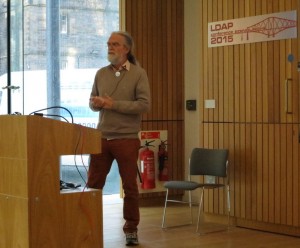Using LDAP as Data Back-end for XML-Data from Digital Humanities Projects
Peter Gietz
DAASI International GmbH
Abstract
Digital Humanities is a research field since the 1960ies where humanities scholars use IT for gaining of insights in research, e.g., by automatic creation of indexes for ancient texts, using statistical analysis for insights about authorships, by geospacial visualization of data, or any other use of computing. At least within the text based research, the XML based standard TEI (Text Encoding Initiative) [1] has established and provides for potential interoperation between different research projects. Since the digitization of cultural heritage has reached a point where DH tools can be used on huge amounts of data the question of which data back-end to use waits for new answers. Obviously dedicated XML databases such as eXist-DB where the first obvious choices, but most of such solutions face scalability issues. New technologies such as NoSQL databases are currently being under discussion. Since most of the data use the hierarchical structure of XML for modeling content, another viable option is LDAP, with all its advantages in scalability, standardized network protocol, etc. This presentation reports on the usage of OpenLDAP as back-end for such DH projects, shows that fairly general usable Identity Management Tools are very useful for such projects. In particular a German federal government funded project on visualizing Jewish cemeteries called Relationen im Raum (Relations in Space)[2] will be introduced, where XML data from the two different humanities Jewish Studies and Architectural History are synchronized to a central LDAP server, and where the data are visualized by a LDAP to Web gateway. The presentation reports on the experiences made during the development of that LDAP client software and gives some pros and cons of this approach.
[1] TEI: http://www.tei-c.org/
[2] Relationen im Raum: https://dev2.dariah.eu/wiki/display/RIRPUB/RiR
Biography
Peter Gietz, M.A. in humanities and involved in Digital Humanities projects and in Identity Management Projects since decades.

